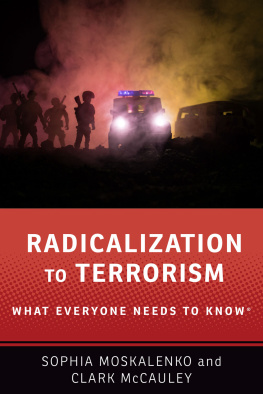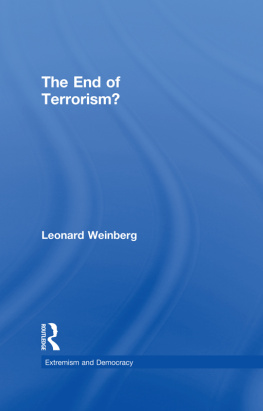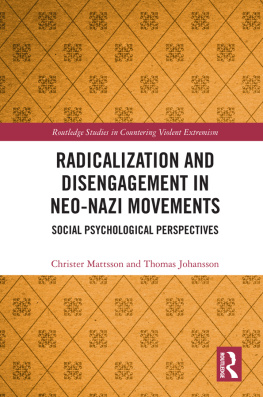What do militants of the old Russian terrorist group, Peoples Will, and current-day al Qaeda have in common? Going beyond stereotypes of terrorists pathological personalities, this book presents compelling evidence of a complex set of causal mechanisms working at the individual and group levels. In many and diverse contexts, this book shows the importance of identification and politicization processes in transforming grievances into action in underground violent organizations.
Donatella Della Porta, Professor of Sociology, European University Institute, and author of Social Movements, Political Violence, and the State: A Comparative Analysis of Italy and Germany
People commonly react to horrendous acts of violence such as the 9/11 attacks by searching for explanations that focus on the culprits. In strong contrast, McCauley and Moskalenko argue that terrorism is fueled by the friction between radical extremists and the individuals and ideas they oppose. This thoughtful, yet readable, book shows that horrendous or not, terrorists cannot escape basic principles of social psychologybut then, neither can the rest of us.
Gary LaFree, Director, National Consortium for the Study of Terrorism and Responses to Terrorism (START), and author of Losing Legitimacy: Street Crime and the Decline of Social Institutions in America
In this excellent book, the authors describe the personal experiences and psychology of individuals, as well as the dynamics of groups, which lead to radicalization. Mechanisms of radicalizationincluding personal and political grievances, ideals, inducement by friends, the attractions of risk-taking and status, and the interdependence of people in groupsare highlighted through stories of terrorists in earlier times and today. This is a compelling, highly readable book that offers impressive understanding of terrorist individuals and groups.
Ervin Staub, Founding Director, Psychology of Peace and Violence Program, University of Massachusetts at Amherst, and author of Overcoming Evil: Genocide, Violent Conflict, and Terrorism
So much has been written about radicalization that is generic or apocryphal that the field needs desperately to find a contribution that is systematic, research-based, clear, and persuasive. And that is the task that McCauley and Moskalenko have taken on, and triumphantly achieved. The book works analytically; it works because it tells the tales of the violent and radicalized comprehensively, and it works because it does not just focus on them, but on us, and on the inter-relationship. In short, it is the most important book written on this complex and politicized subject to date.
Stuart Croft, Professor of International Security, Warwick University, UK, and author of Culture, Crisis and Americas War on Terror
This book introduces twelve mechanisms that underlie political radicalization and lead to violence and terrorism. In their highly systematic yet readable account, the authors identify mechanisms that can be found at work in every terrorist group, whatever its ideology. The authors provide new and effective tools for understanding political events, and for recognizing and controlling the extent to which radicalization affects all of us. Cases of modern and 19th century terrorists are interwoven to offer vividness and historical depth.
Ifat Maoz, Director, Smart Communications Institute, Hebrew University of Israel
Weaving historical narrative and psychological theory effectively and, at times, dramatically, the authors provide a holistic approach to one of the most vexing challenges of our time. Written in a refreshingly accessible and readable style, the book will appeal to scholars, practitioners, and general readers alike.
Paul J. Smith, Associate Professor, National Security Decision Making Department, U.S. Naval War College, and author of The Terrorism Ahead: Confronting Transnational Violence in the 21st Century
This remarkably ingenious and enlightening book looks at how radical terrorists are formed. What is so novel is that it compares at great length the Russian revolutionaries, who tried to overthrow the Czarist regime in the late nineteenth and early twentieth century, to the Islamist terrorists who now occupy our attention. The authors show how strongly terrorists believe in what they are doing, how committed they are, and how difficult it is to defeat them even when many of them are killed. This book will help us see more clearly what we are up against, and what we might need to do to limit the damage.
Daniel Chirot, Tamaki Professor of International Studies, Henry M. Jackson School of International Studies, University of Washington, and author of Why Not Kill Them All? The Logic and Prevention of Mass Political Murder
Both long-term students of political violence and a more general readership will find this book fascinating. It will not only be used in the classroom, but (at least in my personal case) be kept on the shelf as a reference book on key social psychological mechanisms of political radicalization. In my opinion, no other work so smoothly integrates a sophisticated treatment of social psychology into the important, and poorly understood, subject of political violence and terrorism.
Roger Petersen, Arthur and Ruth Sloan Chair of Political Science, Massachusetts Institute of Technology, and author of Understanding Ethnic Violence: Fear, Hatred, Resentment in Twentieth-Century Eastern Europe
Friction
How Radicalization Happens to Them and Us
Clark McCauley, PhD
Sophia Moskalenko, PhD


Oxford University Press, Inc., publishes works that further
Oxford Universitys objective of excellence
in research, scholarship, and education.
Oxford New York
Auckland Cape Town Dar es Salaam Hong Kong Karachi
Kuala Lumpur Madrid Melbourne Mexico City Nairobi
New Delhi Shanghai Taipei Toronto
With offices in
Argentina Austria Brazil Chile Czech Republic France Greece
Guatemala Hungary Italy Japan Poland Portugal Singapore
South Korea Switzerland Thailand Turkey Ukraine Vietnam
Copyright 2011 by Oxford University Press, Inc.
Published by Oxford University Press, Inc.
198 Madison Avenue, New York, New York 10016
www.oup.com
Oxford is a registered trademark of Oxford University Press, Inc.
All rights reserved. No part of this publication may be reproduced,
stored in a retrieval system, or transmitted, in any form or by any means,
electronic, mechanical, photocopying, recording, or otherwise,
without the prior permission of Oxford University Press
Library of Congress Cataloging-in-Publication Data
McCauley, Clark R.
Friction: how radicalization happens to them and us / Clark McCauley, Sophia Moskalenko.
p. cm.
Includes bibliographical references and index.
ISBN 978-0-19-974743-6 (hbk.: alk. paper) 1. RadicalismPsychological aspects.
2. Political violencePsychological aspects. 3. TerrorismPsychological aspects.
I. Moskalenko, Sophia. II. Title.
HN49.R33M43 2011
303.625dc22
2010019934
Printed in the United States of America
on acid-free paper
Table of Contents
Acknowledgments
We have piled up large debts in writing this book. We owe thanks to Bryn Mawr College for supporting the Solomon Asch Center for Study of Ethnopolitical Conflict, which has been the occasion of our continued collaboration. We owe thanks to the Department of Homeland Security for support of our research through the National Consortium for Study of Terrorism and Responses to Terrorism (START), although of course our opinions should not be attributed to START or DHS. We owe special thanks to three scholars whose work has shaped our understanding of radicalization and terrorismMartha Crenshaw, Donatella Della Porta, and Michael Scheuerand to our editor Lori Handelman for her faith in the project. Clark owes thanks to the Harry Frank Guggenheim Foundation, and its program officer Karen Colvard, for opportunities to learn about terrorism in the 1980s, and to Petter Nesser for permission to quote from his case study of Muhammad Bouyeri. Sophia owes thanks to Roman Kamenetsky for permission to use documents from his website collection of materials relating to Peoples Will (www.narovol.narod.ru). And of course we owe thanks to our families for putting up with our focus on matters that are not always good dinner table conversation.
Next page








